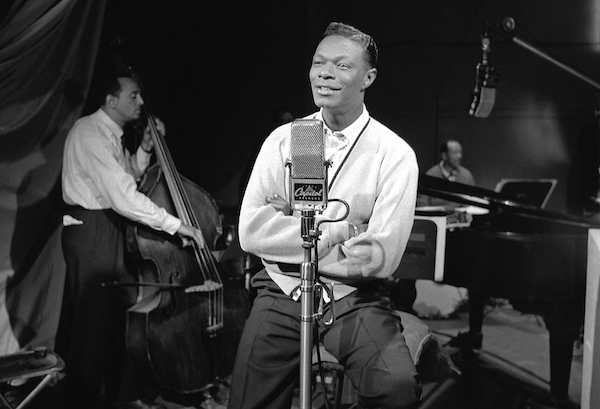Jan 13, 2026 2:09 PM
More Trump-Kennedy Center Cancellations
The fallout from the renaming of the John F. Kennedy Center for the Performing Arts to include President Donald…

Nat “King” Cole sat at the crossroads of jazz and pop.
(Photo: Capitol Photo Archives)The trio would linger into the early 1950s, increasingly augmented by orchestral accompaniments. Within a few years, though, a whole new generation of Baby Boomer fans would have no idea that Cole had ever played jazz piano. Capitol trusted him with just about anything from teenage bubblegum tunes (“Pigtails And Freckles”) to commercial country (“Ramblin’ Rose”) and even unlikely pop covers (“Mule Train”). But his immortality rests on a catalog of albums done with Nelson Riddle, Gordon Jenkins and Pete Rugolo, and his sub-rosa brilliance as one of the great pianists of jazz history. He was incomparable.
As racial tensions rose in the 1950s, Gastel persuaded NBC that Cole’s low-key appeal was broad enough to sustain his own variety program. Numerous pop singers had their own shows in those days, and The Nat King Cole Show began airing in November 1956. The ratings were excellent. But after two years, no sponsor had dared to touch the program, despite the biggest stars in show business doing guest shots at scale. One episode was devoted entirely to Norman Granz’s current JATP ensemble, the only time it ever appeared on nation television. But NBC canceled it after 13 months, the move remaining one of the more craven examples of Madison Avenue hypocrisy taking cover behind a pretext of practicality.
Cole was of a generation of black stars that kept its politics to themselves. His response to racial affronts and his willingness to tolerate segregated audiences was seen as passive. But if Cole lost that social-justice skirmish with NBC, he had already won a war of far greater cultural consequence and without fully realizing it, maybe because it was almost subliminal.
Some might be surprised to learn that as late as the mid-’40s race protocols in America did not recognize the black singer as an agent of romance. “It sounds ridiculous, but it’s true,” vocalist Billy Eckstine told DownBeat years later. “We weren’t supposed to sing about love. We were supposed to sing about work or blues and some dumb crap.” Eckstine became famous just before Cole by singing precisely that kind of “dumb crap” (“Jelly Jelly”). It’s why Cole’s early trio repertoire is full of novelty tunes and jingles—the kinds of things we forgive him for today because they were obligatory for him in ways they were not for Bing Crosby, Sinatra or Bennett.
But in transitioning at Capitol from jazz pianist to commercial pop singer of the highest order, Cole, his music and his manner combined to accomplish what no performer of color ever had done: make it acceptable for a black vocalist to sing intimate, sexually implicit, love songs to white audiences without anyone breaking a sweat. Later audiences who would embrace Johnny Mathis and Johnny Hartman without a second thought no doubt did so without ever imagining that it had ever been otherwise.
One wonders who might have achieved such a velvet victory if Cole had decided in 1943 to go with Norman Granz and JATP, instead of Carlos Gastel’s show business course. The jazz world’s loss might, in the end, have been a net gain for American civility. Revenge is sweetest when it changes the world. DB

Belá Fleck during an interview with Fredrika Whitfield on CNN.
Jan 13, 2026 2:09 PM
The fallout from the renaming of the John F. Kennedy Center for the Performing Arts to include President Donald…

Peplowski first came to prominence in legacy swing bands, including the final iteration of the Benny Goodman Orchestra, before beginning a solo career in the late 1980s.
Feb 3, 2026 12:10 AM
Ken Peplowski, a clarinetist and tenor saxophonist who straddled the worlds of traditional and modern jazz, died Feb. 2…

The success of Oregon’s first album, 1971’s Music Of Another Present Era, allowed Towner to establish a solo career.
Jan 19, 2026 5:02 PM
Ralph Towner, a guitarist and composer who blended multiple genres, including jazz — and throughout them all remained…

Rico’s Anti-Microbial Instrument Swab
Jan 19, 2026 2:48 PM
With this year’s NAMM Show right around the corner, we can look forward to plenty of new and innovative instruments…

Richie Beirach was particularly renowned for his approach to chromatic harmony, which he used to improvise reharmonizations of originals and standards.
Jan 27, 2026 11:19 AM
Richie Beirach, a pianist and composer who channeled a knowledge of modern classical music into his jazz practice,…